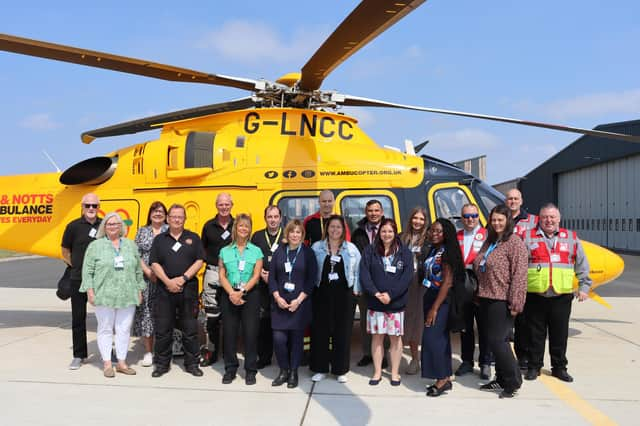Air ambulance thanks partners on World Blood Donor Day


Lincs & Notts Air Ambulance carries blood on its helicopter and critical care cars.
It was a special moment as delegates from the ‘Blood on Board’ partnership came together to have a tour of the helicopter and a behind the scenes visit of LNAA head-quarters.
Advertisement
Hide AdAdvertisement
Hide AdBlood on Board was created in 2017, enabling LNAA to carry blood to the scene of critical incidents.
Since then, 504 units of blood have been given to patients, from those involved in serious road traffic collisions to mothers in childbirth.
Dr Tom Eckersley, lead on the ‘Blood on Board’ initiative at LNAA said: “Blood products are given to patients who have suffered life-threatening bleeding most commonly as a result of trauma from a road traffic collision. Carrying blood products has undoubtedly allowed LNAA to save more lives by enabling patients who would have previously died from blood loss get to hospital.
"Giving blood also improves the condition of those arriving in hospital so they can undergo life-saving surgery.”
Advertisement
Hide AdAdvertisement
Hide AdCarrying blood on board is made possible thanks to a joint agreement between LNAA, United Lincolnshire Hospitals Trust (ULHT) - (who provide the blood free of charge to the LNAA), Northern Lincolnshire and Goole Hospitals, Path links Pathology Service Provider, Lincolnshire Emergency Blood Bikers Service (LEBBS), Nottinghamshire Emergency Blood Bikes (NBB) and Nottingham’s Queen’s Medical Centre (QMC).
Once a donor has given blood it is separated into red cells and plasma at NHS Blood and Transplant (NHSBT) sites. These components are then stored until needed by the hospitals and Air Ambulance
Tom continued: “We carry four units of red blood and four units of FFP on our helicopter and in our critical care cars. If you are suffering life-threatening bleeding, it is essential to have both so that we can help the body to clot and stop bleeding and keep vital oxygen being delivered to the organs.”
Adele Turner, Deputy Lab Manager Blood Transfusion at ULHT said: “This service would not be possible without the people behind the scenes that allow the LNAA to deliver this capability. This ultimately save lives and improves patient outcomes.”